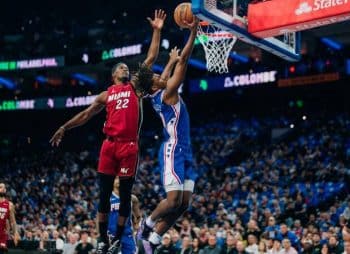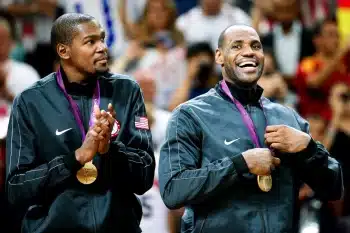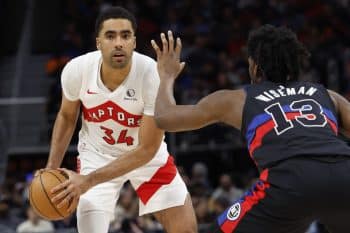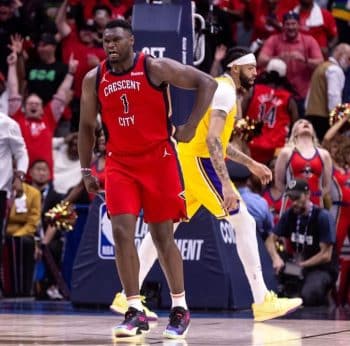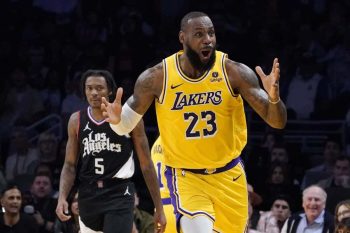NBA
NBA Trade Watch: The Southeast

The Southeast Division features the two worst teams in the NBA (the Atlanta Hawks and Orlando Magic), as well as the disappointing Charlotte Hornets and a pair of teams in the thick of the playoff race (the Miami HEAT and Washington Wizards). It’s a down year for a division that’s been pretty tough in the past.
With the NBA’s trade deadline right around the corner, here’s a look at things to keep an eye on for the Southeast.
Atlanta Hawks (11-30)
Losing former All-Stars Al Horford, Jeff Teague and Paul Millsap in the space of two seasons has been more than the Atlanta Hawks could overcome. The result will almost certainly be the first missed playoffs since the season before Atlanta drafted Horford. Atlanta’s 10 consecutive playoff appearances trails only the Spurs (20). And with the Grizzlies and Clippers also in danger of missing the postseason, it could be the Rockets and Warriors sharing second place with six consecutive appearances each if they make it.
And the Hawks might not be done bleeding talent.
Dennis Schroder may not be long for Atlanta. The mercurial point guard is nearly impossible to guard, but he isn’t a leader. It’s hard to believe that a player who frequently dresses down teammates when they make mistakes, then goes out and shoots a two-pointer at the buzzer in a game the Hawks trailed by three, understands accountability. Schroder is known for his after-hours lifestyle, which resulted in a battery arrest in September.
Notable Ending Contracts:
Marco Belinelli — $6,606,060
Ersan Ilyasova — $6,000,000
Dewayne Dedmon — $6,000,000 ($6.3 million player option)
Mike Muscala — $5,000,000 ($5 million player option)
Malcolm Delaney — $2,500,000 ($3,125,000 qualifying offer)
Luke Babbitt — $1,471,382
Names Worth Talking About:
The name most worth talking about for the Atlanta Hawks is Trae Young. The Hawks are being outscored by 6.2 points per 100 possessions with Schroder on the court, a net rating that is worse than any other Hawk with at least 600 minutes this season except Marco Belinelli (-9.2). Young could be a generational talent. Schroder is an offensive-minded point guard who doesn’t make his teammates better.
Hawks GM Travis Schlenk was part of the Warriors front office that drafted Stephen Curry in 2009, then made the momentous decision to trade Monta Ellis and build around Curry in March of 2012. Young gets compared to Curry because of the absurd range on his shot, but he’s leading the nation in both scoring and assists. If his game translates to the NBA level, he’ll be a nightmare to guard in the pick and roll. Getting value for Schroder could be difficult due to the off-court issues.
Another player to keep an eye on is Kent Bazemore, who turns 29 in July. With Atlanta building a young core, Bazemore will likely be in his 30s by the time the Hawks are ready to make a run to the playoffs. One team to watch regarding Bazemore is the New Orleans Pelicans, which signed small forward Solomon Hill to a four-year, $52 million deal in 2016 only to lose him to a hamstring injury that has prevented him from playing this season.
Biggest Area of Need at the Deadline:
The Hawks need to get whatever assets it can for players on expiring contracts or player options. Among expiring contracts, Ersan Ilyasova has started nearly 400 games and has the best on-court net rating of any Hawk with at least 700 minutes. Belinelli’s name gets thrown around, but as mentioned, he hasn’t been good.
Dewayne Dedmon has also struggled and been slowed by injury. His nearly 44 percent shooting from three on 32 attempts this season after attempting only one three in his first four seasons has been a shock. Dedmon has a player option and could test free agency this summer, which makes it difficult for the Hawks to get value by trading him before the deadline. Luke Babbitt had excellent on/off numbers as a starter for the HEAT last season but hasn’t made much of a dent in Atlanta.
Basketball Insiders senior writer Michael Scotto reported Thursday that the Hawks are seeking high second round picks for the expiring veterans. The Raptors and Rockets are contenders currently in position to pick high in the second round, according to NBADraft.net.
Charlotte Hornets (15-24)
Things look grim for the Hornets, which currently sit five games out of the eighth playoff seed in the East. However, the team will play seven of the next eight at home. This gives Charlotte a chance to show improvement ahead of the deadline and help the front office decide if it should be buyers or sellers.
Notable Ending Contracts:
Michael Carter-Williams — $2,700,000
Johnny O’Bryant — $1,524,305
Names Worth Talking About:
Tim Bontemps of the Washington Post wrote a speculative piece suggesting that the Hornets should trade Kemba Walker to jump-start a rebuild and help the team avoid future luxury tax penalties. Most of the roster is under contract through next season and Charlotte, as currently constructed, would be a tax team in 2018-19. That will be a tough pill for Michael Jordan to swallow if his team misses the playoffs again this season.
If the Hornets actually make Walker available, half the league would likely register interest. Trading Walker wouldn’t just trigger a rebuild, it would tear the Hornets down to the studs. Charlotte is 13.4 points per 100 possessions worse whenever Walker is out of the game, an impact that is double that of any other player. Kemba Walker is the Charlotte Hornets. It’s hard to imagine the fan backlash if such a move was executed.
Biggest Area of Need at the Deadline:
Charlotte’s top six players, including Walker, Michael Kidd-Gilchrist, Dwight Howard, Marvin Williams, Nicolas Batum and Jeremy Lamb, have been solid all season. All six have posted a positive on-court net rating. But from there, the bench falls off a cliff, ranging from Cody Zeller’s -3.6 to Malik Monk’s -14.6. Michael Carter-Williams and Johnny O’Bryant are the only expiring contracts, but they’ve posted a -7.4 and -9.5 net rating, respectively. The Hornets need any bench help they can get, but will have trouble making moves due to the cap. Backup point guard continues to be the biggest issue, with neither Carter-Williams nor Monk making a positive impact.
Miami HEAT (24-17)
After an 11-13 start, during which the HEAT barely resembled a team ready to build on last season’s near playoff run, Miami has gone 13-4 and rocketed to fourth in the East. That’s a lot more like last season’s team, which closed the season 30-11, only to miss the playoffs on a tiebreak. The problem is that, unlike the HEAT of LeBron James and Dwyane Wade, these HEAT are decidedly lacking in star power. Miami has taken the intriguing route of spending over the cap on a group of overachievers in a way that could limit the team’s ceiling.
Notable Ending Contracts:
Wayne Ellington
Names Worth Talking About:
People are talking about HEAT center Hassan Whiteside. A lot. Barry Jackson of the Miami Herald wrote Wednesday that he spoke to two NBA scouts who speculate the HEAT could get a late lottery pick for Whiteside. That strains credulity. What team in possession of a lottery pick is so desperate for a center that it would trade for one who has been made virtually obsolete by Bam Adebayo and Kelly Olynyk?
As the HEAT have surged, Whiteside’s impact has been marginal. He’s playing just 25.8 minutes per game, his fewest since the 2014-15 season. And in a league where the traditional center is fast becoming fossilized, ESPN’s Zach Lowe notes that Whiteside is shooting just 42 percent on post-ups, which ranked 43rd out of 52 players with at least 50 attempts.
The real name worth talking about is Wayne Ellington, who is shooting 41 percent on over seven three-point attempts per game. He’s the only notable Miami player on an expiring contract, and that status puts the HEAT in a tough position. Miami has most of its roster under contract through next season, which places it in luxury tax territory. The HEAT outscore opponents by 2.8 points per 100 possessions with Ellington on court, a team-best net rating by more than two full points. The team may have to dangle Ellington in trade talks in hopes of getting an asset back since it will be extremely difficult to retain him past this season.
Biggest Area of Need at the Deadline:
Aside from getting something significant in return for Ellington, the best result for Miami would be to move off one of its larger contracts to subdue the salary cap issues and add flexibility. Moving Whiteside would accomplish this, assuming the HEAT took significantly less salary back, but it would leave the team without a proven rim protector. Such an outcome seems unlikely, as does getting a significant return for Justise Winslow, whom the Celtics reportedly pursued with a chest of draft picks during the 2015 draft but has yet to develop into an impact player.
Orlando Magic (12-30)
Victor Oladipo’s emergence with the Pacers has left the Magic organization with egg all over its face. The team drafted a young core, panicked, tried to leapfrog into the playoffs with veterans, and now sits a half game ahead of the league-worst Atlanta Hawks. There’s no way to sugar coat this: The Magic are years away from putting a competitive product on the floor and will have to go back to building through the draft.
Notable Ending Contracts:
Shelvin Mack — $6,000,000 ($6 million non-guaranteed in 2018-19)
Mario Hezonja — $4,078,320
Arron Afflalo — $1,471,382
Names Worth Talking About:
Things might have been different if Elfrid Payton had popped early. With Aaron Gordon emerging as one of the league’s exciting young players and center Nikola Vucevic — out of nowhere — shooting over 34 percent on 140 three-point attempts, Orlando might have had something with a stud point guard and a do-over on the Oladipo trade. As it stands, despite Payton shooting a career-best 37.5 percent from three, the Magic are being outscored by nine points per 100 with him on the floor.
Vucevic has the best net rating among Magic with at least 500 minutes, and one of the league’s more team-friendly contracts with just over $12 million on the books this season and just under $13 million next. But it may be too late to get anything significant for him. Meanwhile, Evan Fournier’s flat $17 million guaranteed for three seasons starting this season with a player option in the fourth is prohibitive for a player not known for his defense. And let’s not even talk about Bismack Biyombo, who sports a team-worst -15.4 net rating and is guaranteed $17 million this season and next with a player option after.
Biggest Area of Need at the Deadline:
Where to begin? The Magic need everything. There’s a decided lack of defensive identity after Orlando traded Oladipo, a two-way wing (among the league’s most precious commodities). Jonathon Simmons has played the most minutes on the team but his -9.4 net rating is worse than anyone but Biyombo. The team declined its option on Mario Hezonja so it likely can’t get anything for him. He’ll probably emerge as a rotation player for a less dysfunctional franchise after he hits free agency this summer.
Washington Wizards (23-18)
The Wizards are spent into the luxury tax and in full win-now mode. John Wall, Bradley Beal, Otto Porter and Ian Mahinmi are all locked up through at least the 2019-20 season. Marcin Gortat, Markieff Morris, Tomas Satoransky and Kelly Oubre are fully guaranteed through next season. Injuries and inconsistency have been a factor, and fifth in the East just doesn’t feel good enough for a team that aspires to contend.
Notable Ending Contracts:
Jason Smith — $5,225,000 ($5.45 million player option)
Jodie Meeks — $3,290,000 ($3.45 million player option)
Tim Frazier — $2,000,000
Names Worth Talking About:
Mahinmi has played only 571 minutes, but his +4.6 net rating is fourth on the team and some small comfort after the team invested major dollars in him. There’s almost no chance another team would take his contract, but at least the Wizards are performing well when he’s available. Marcin Gortat likewise appears to be a player few if any teams would be interested in.
Mike Scott has been a pleasant surprise with 9.4 points per game, which is good for sixth on the team. Washington only signed him to a one-year, veteran’s minimum deal, so he can test free agency after the season with the Wizards facing a cap crunch.
Biggest Area of Need at the Deadline:
Backup point guard Tim Frazier’s -6.7 net rating is a team worst and Jodie Meeks is next at -3.8. Jason Smith has played only 160 minutes. None has trade value. The Wizards’ biggest need is depth and an upgrade at backup point guard. But with the team’s cap situation and lack of assets, it’s going to be very tricky to get anything done.
With the Southeast Division’s competitive teams lacking cap space and lesser teams short on attractive trade assets, this could be a ho-hum deadline in Dixie. That is unless the Hornets go crazy and make Walker available, or another unexpected piece suddenly comes on the market. The league is still coming to terms with the hangover from the cap explosion of recent seasons. And with cap levels set to remain relatively flat in coming seasons, deadline deals will be harder to execute than in recent years.
